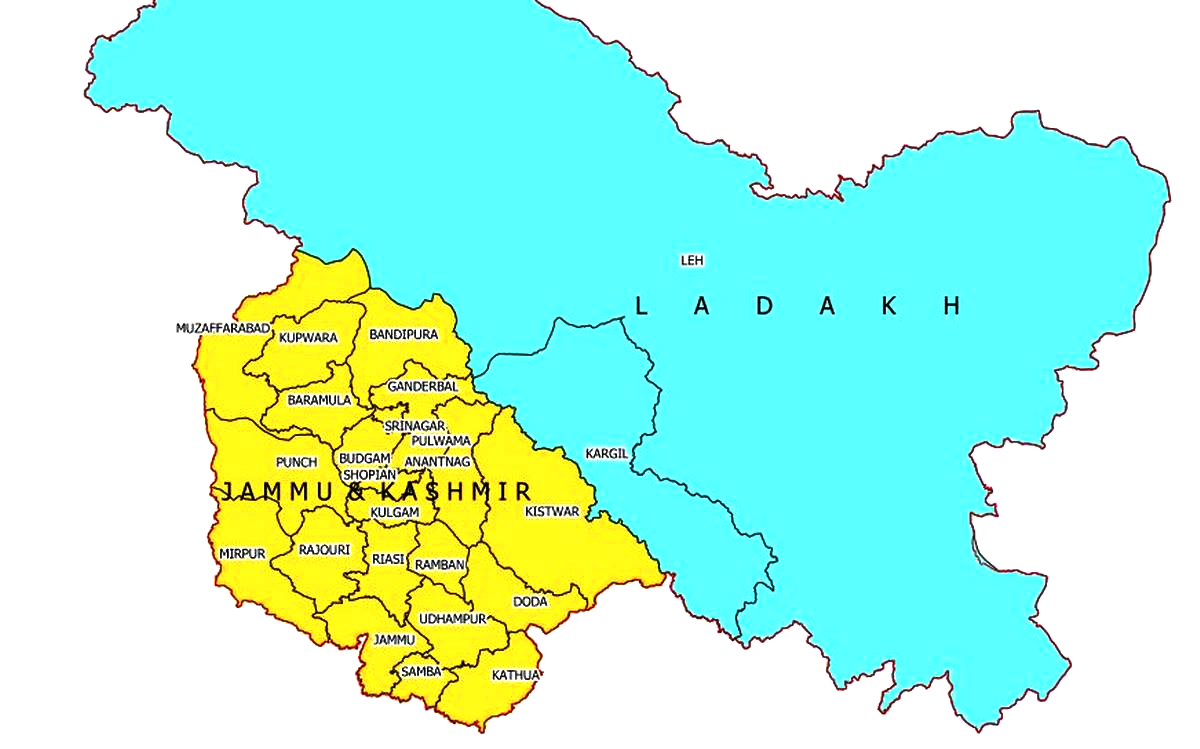Governance
Second Anniversary of Special Status Revocation: J&K
- 06 Aug 2021
- 6 min read
Why in News
The Forum for Human Rights in J&K (FHRJK) released its report a day ahead of Jammu and Kashmir (J&K) completing two years as Union Territory.
- The report raised concerns about the militancy that continues to remain a major challenge in J&K.
- FHRJK is an independent body co-chaired by former Supreme Court judge Justice Madan B. Lokur and former Kashmir interlocutor Radha Kumar.
Key Points
- Background:
- On 5 August 2019, the government of India revoked the special constitutional status of the erstwhile state of Jammu and Kashmir under Article 370 of the Constitution, and abrogated Article 35A.
- Article 35A had allowed J&K to define who its ‘permanent residents’ are and what rights and privileges are attached to such residency.
- The former state was bifurcated into the Union Territories of Ladakh (without a legislature) and Jammu-Kashmir (with a legislature).
- Concurrently, the Indian government imposed a near-total telecommunications lockdown in the region, detained political leaders and dissidents, and enforced Section 144 of the Indian Penal Code to prevent violent unrest.
- On 5 August 2019, the government of India revoked the special constitutional status of the erstwhile state of Jammu and Kashmir under Article 370 of the Constitution, and abrogated Article 35A.
- Findings from the Report:
- The reports raised concerns regarding human rights abuses, arbitrary detentions, prohibition on assembly and censorship on local media houses in J&K.
- The government has taken several positive steps, but they fell short of expectations.
- It also held that the counter-insurgency concerns continue to be given priority over public, civilian and human security.
- Reasons for Militancy in J&K:
- Since the special constitutional position of Jammu and Kashmir (J&K’s) under Article 370 was ended and it was divided into two UTs of J&K and Ladakh, a section of people in J&K has been protesting against the decision.
- Further, allowing Indian citizens to buy land in Jammu and Kashmir (J&K) without being a domicile, has angered the local people.
- Following this the militancy in the J&K, aided by cross-border support, continues to affect the region.
- This is coupled with misuse of draconian legislation, such as the Public Safety Act (PSA) and the Unlawful Activities Prevention Act (UAPA).
- Furthermore, there are growing fears that the Taliban takeover of Afghanistan is likely to further deteriorate the security conditions.
- Since the special constitutional position of Jammu and Kashmir (J&K’s) under Article 370 was ended and it was divided into two UTs of J&K and Ladakh, a section of people in J&K has been protesting against the decision.
- Steps Taken by Government & Judiciary:
- Promoting Industrial Development: Recently, the Department for Promotion of Industry and Internal Trade has notified New Central Sector Scheme for industrial development of Jammu and Kashmir.
- The scheme offers four incentives namely:
- Capital Investment Incentive,
- Capital Interest subvention,
- Goods & Service Tax Linked Incentive
- Working Capital Interest Subvention.
- The Scheme will help in creation of more employment opportunities and promotion of tourism in the region.
- The scheme offers four incentives namely:
- AB-PMJAY SEHAT Scheme: The Scheme provides free of cost insurance cover. It provides financial cover upto Rs. 5 lakh per family on a floater basis to all residents of the UT of J&K.
- Ceasefire Agreement: Indian and Pakistani Directors-General of Military Operations (DGMOs) agreed for restricted infiltration by armed groups and raised hopes that a wider peace process might follow.
- Elections in J&K: The Union government sought to conduct elections in J&K.
- However, the government held that the elections would be held for a UT assembly. On the contrary, regional parties are of the view that they will participate in the election, after statehood to J&K has been reinstated.
- Supreme Court Verdict on Internet Shutdown: The Supreme Court gave a judgement in response to petitions filed, arguing the Internet shutdown and curbing of other civil liberties in the J&K.
- The court held that suspension could be done for temporary duration only and the same is subject to judicial review.
- Special Package for J&K and Ladakh under Deendayal Antyodaya Yojana-National Rural Livelihood Mission.
- Promoting Industrial Development: Recently, the Department for Promotion of Industry and Internal Trade has notified New Central Sector Scheme for industrial development of Jammu and Kashmir.
Way Forward
- The Human rights forum recommended release of all remaining political detainees and repeal of the PSA and other preventive detention legislation.
- It also called for involvement of local communities in facilitating the return of Kashmiri Pandits.
- Peace framework in J&K can be established by implementing the vision of former Prime Minister of India (Atal Bihari Vajpayee) - Kashmiriyat, Insaniyat, Jamhooriyat (inclusive culture of Kashmir, humanitarianism and democracy) for Kashmir solution.







